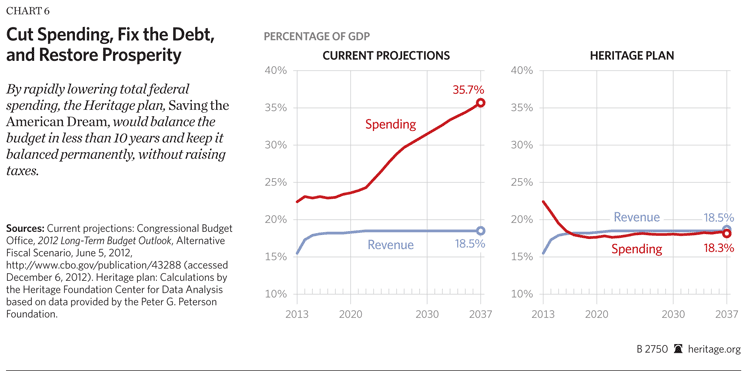Obama Tax Hikes Will Balance the Budget (April Fool’s)
Romina Boccia /
 In the ongoing debate over deficit reduction, President Obama and his colleagues in the House and Senate incessantly call for tax increases as if our budget problems persisted because of taxes being too low. If only the federal government could usurp more of taxpayers’ hard earned money, the line of thought goes, Washington could get its fiscal house in order, and maybe, just maybe, balance the budget some day.
In the ongoing debate over deficit reduction, President Obama and his colleagues in the House and Senate incessantly call for tax increases as if our budget problems persisted because of taxes being too low. If only the federal government could usurp more of taxpayers’ hard earned money, the line of thought goes, Washington could get its fiscal house in order, and maybe, just maybe, balance the budget some day.
Say, it ain’t so? Nah, April Fools!
The Heritage Foundation has explained that spending too much is at the root of our budget crisis. But for those still skeptical, here’s a recent response from the nonpartisan Congressional Budget Office (CBO) to a question about the primary drivers of federal deficits over the next decade:
[B]oth outlays and revenues are projected to be higher than their historical average shares of the economy’s total output.
Translation: Taxes are going up, folks, but spending is going up even more.
The CBO further writes:
CBO expects that, under current law, outlays will be above their historical average primarily because the aging of the population, rising health care costs, and a significant expansion in eligibility for federal subsidies for health insurance will push up spending for Social Security and the major federal health care programs (Medicare, Medicaid, and the subsidies to be provided through insurance exchanges).
Translation: Growing spending on Social Security and federal health care programs is causing chronic deficits in the federal budget. Obamacare’s newest entitlements—the Medicaid expansion and health care subsidies—dramatically worsen federal spending, increasing it by now $1.8 trillion over a decade.
The CBO also states:
Other broad categories of spending are expected to represent smaller shares of GDP [gross domestic product] than they have been [sic] in the past: Mandatory spending other than for Social Security and the major health care programs is projected to average 2.6 percent of GDP, compared with a 40-year average of 3.0 percent; defense spending is projected to average 3.0 percent of GDP, compared with a 40-year average of 4.7 percent; and nondefense discretionary spending is projected to average 3.0 percent of GDP, compared with a 40-year average of 4.0 percent.
Translation: The now four big entitlements—Social Security, Medicare, Medicaid, and Obamacare—are overwhelming the budget as most other spending categories, and especially spending on national defense, are falling as a share of the economy.
Most reasonable human beings when confronted with a problem they are serious about solving would seek to identify the source of the problem and fix it. If your faucet was leaking increasing amounts of water, you might inspect it to identify what was causing the leak and either fix it or replace it. Most likely you would not inject more water into the pipes from the backend as this would only exacerbate your problem. Why then is it that President Obama and others in Congress, when confronted with growing federal spending that is bleeding red all over the budget, propose to raise taxes, again and again?
President Obama scored a major tax increase this January, which many Americans will only come to fully realize next April when many of the 13 tax increases will be reflected on their 2013 returns. This tax hike won’t come even close to balancing the budget despite it pushing revenues above their historical average level. Nor would another tax hike, as President Obama and Senate Democrats are calling for, resolve the nation’s budget problem.
The source of America’s spending and debt crisis is crystal clear—and resolving it is urgent. The federal entitlement programs need reform and they need it now. For example, there are bipartisan entitlement reform proposals the President could lead on in his long-delayed budget (expected on April 10).
Going beyond those easy-to-adopt changes that would help the financing of these programs, Heritage’s plan—Saving the American Dream—would strengthen programs like Social Security and Medicare so they are more effective at protecting seniors from poverty in retirement and work better for those most vulnerable in society.
Balancing the budget with tax hikes is an April Fools’ proposal. Balancing in less than 10 years while strengthening entitlement programs for those who need them the most, providing adequate resources for America’s national defense, and all without raising taxes, however, is a proposal that could become reality with some bold leadership from Congress and the President.

